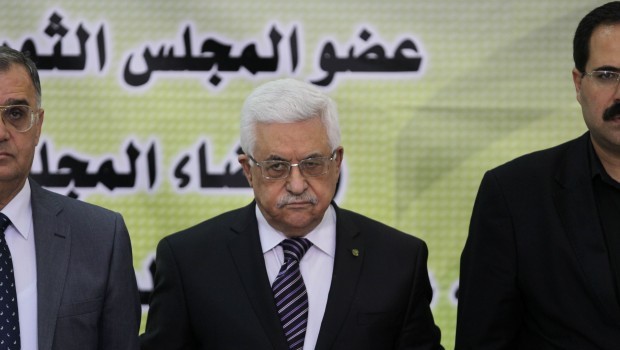
Palestinian Authority president and head of the Fatah movement, Mahmud Abbas (C) attends a Fatah “Revolutionary Council” meeting along with top officials in the Palestinian West Bank city of Ramallah on September 1, 2013. (AFP PHOTO/ABBAS MOMANI)
Speaking at a meeting of the Revolutionary Council of the Fatah Movement, Abbas said: “The situation in Syria is dangerous, America is going to strike Syria with missiles. Our stance is unchanged, we are against the strike. We do not accept any strike against an Arab country, we will not allow that. At the same time, we condemn the use of chemical weapons and we want a peaceful solution for the Syrian crisis.”
He added: “I would like to tell you that we made a proposal for a peaceful solution which was accepted by all international parties, America, Russia and China, and many Arab countries and internal parties. It will be the basis for their negotiations, because we said from a nationalist point of view that we did not want the Syrian people to suffer more destruction.”
Abbas also said that there was no “military solution” to the crisis in Syria, “because a military solution will end in one of two scenarios: division according to sectarian or ethnic basis, to take Syria back to where it was before 1924 when it was divided by France into four states, the Alawite, Aleppo, Damascus and Druze states. The other scenario is an endless civil war.”
He continued: “I told our foreign minister at the Arab League to declare our objection to war and the use of chemical weapons,” adding that “if someone attacked an Arab we will not be on their side. For instance, we are with the UAE with regards to the islands [the Gulf island disputed with Iran]. From that point of view, we are against an attack on an Arab state, and therefore we are against America using missiles to strike Syria.”
Abbas emphasized that he rejected any interference in the affairs of Syria, Tunisia, Lebanon, or Egypt, and that he was hoped for good relations with all parties.
He went on: “We want to preserve this relationship because we need Arab support.” He also criticized Hamas by saying “we do not want to be like Hamas, who was in Syria’s bosom while we were on the outside, and then in a blink, it abandoned the Syrian government in a deplorable manner.”
Abbas said: “Hamas is interfering in Egypt and this [information] is not from the Egyptian media, it is from internal sources.”
He added that “our people in Gaza were not against Egypt. Hamas is the party which is working against Egypt and we are against it.”
Meanwhile, Abbas criticized the policy of the United States towards Islamist movements. He said: “Believe me, there are strong pressures from America and Israel regarding the reconciliation. This represents a contradiction in American policy, they do not want reconciliation with Hamas, but they want the return of the Brotherhood in Egypt. Even then, we want the reconciliation according to the conditions we agreed in Cairo. 1967 borders, peaceful popular resistance, and Abbas has the right to negotiate, and when all that is done, we agree and then [we hold] elections.”
Abbas accused Hamas of duplicity, saying it declared it was against the negotiations and did not want to recognize Israel, and yet, “they are in negotiations with Israel which are continuing and have not been interrupted, they are historic and have not been interrupted.”
In regards to the ongoing negotiations with Israel, Abbas said the negotiations between the two sides were still at an early stage.
He said “the principle which allowed the negotiations to start, was the agreement that the basis of these negotiations was a two-state solution based on the 1967 borders, and that there was an American demand not to contact international organizations during the negotiations, but we rejected that, and we said we would be prepared to do that if the pre-1994 prisoners were released.”
